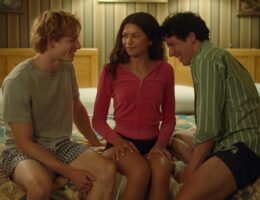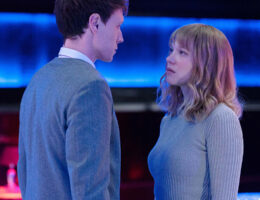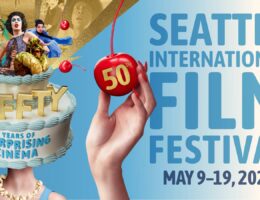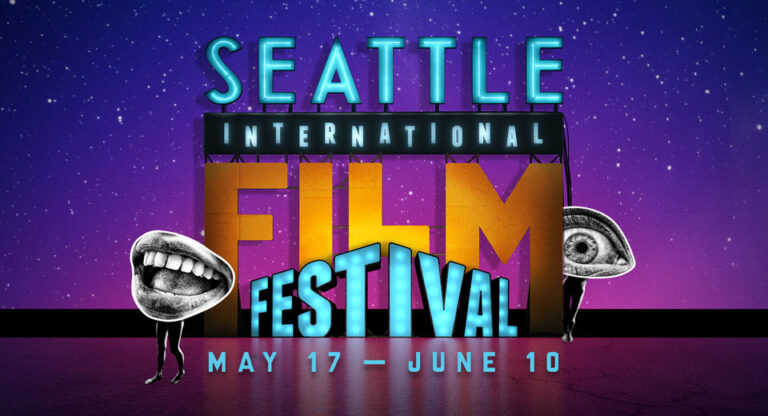We’re just past SIFF’s Centerpiece Weekend and are now in final week of the 44th Seattle International Film Festival. To mark the occasion, your friends from the SunBreak’s SIFF Team paused our movie marathoning to convene and chat about the festival. Let’s start with the big picture as it were: how’s your SIFF so far?
Tony: Due to a gaggle of writing assignments (most SIFF-related) for other outlets, this has been one of my slowest SIFFs ever. That said, the tiny handful of things I’ve seen have mostly been choice.
Chris: I have been trying to get to as many SIFF movies as I can, and talking to as many filmmakers. My employment situation is becoming a little more tenuous, so I’ve tried to invest in SIFF as much as I can this year, and it has been rewarding overall. I think this has been a good overall SIFF. I think I’m experiencing a pretty high batting average with regard to movies I’ve enjoyed.
Josh: I’ve found it hard to dive deep into SIFF and admit to taking a few nights off for summer blockbusters, but am still keeping to an average of one film per day. I even missed the Opening Night film due to other commitments, but did manage to swing by Fisher Pavillion for the end of the party, the rush to clean up at the bar before last call, the ill-advised swarm to the cupcakes table on the way out, and tidbits of gossip from fellow gala-goers. Interested to hear your takes on it — word on the street suggests that The Bookshop isn’t going to find its way into the Opening Night hall of fame?
Morgen: The red carpet opening gala was devoid of big names like in the past but that’s not necessarily an indicator of how much I’ll enjoy the fest as a whole.
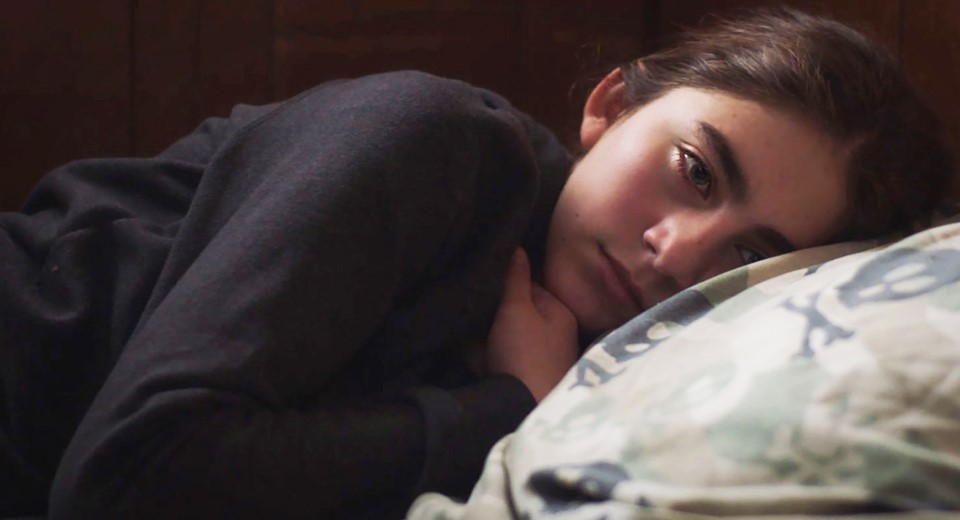
We’re well past the midpoint of the festival — any contenders for your Golden SunBreak Awards?
Tony: The two best that I’ve seen, interestingly, have been fiction narratives so far: New Zealand film Waru, one of those ‘novelty anthologies,’ in which several directors are tasked with making short films under unusual assignment conditions. In the case of Waru, eight New Zealand directors, all female and all of indigenous Maori descent, were each given a ten minute limit. And their vignettes were required to be filmed in one continuous, unedited shot. The simple logistic achievement of every one of theses eight vignettes is one amazing thing; that they all land is another. It’s pure magic, stem to stern, with thought and heart to spare. The other: Sadie, the latest from PNW director Megan Griffiths.
Chris: Tony, I’m glad you’ve enjoyed Sadie. I do think this is probably Griffiths’s best film yet. It spoke to me as someone whose parents divorced when I was a teenager and who had lots of terrible thoughts in my head at the same time. It also touched on a lot of very relevant issues in the news today, like opioid addiction and bringing guns to school.
Tony: When I interviewed Griffiths for another website, I told her that I knew people like those depicted in Sadie, and that she treated ostensible ‘trailer trash’ as relatable, flawed but mostly OK human beings. And one detail about the movie that I didn’t end up having copy space for was the entire ensemble’s work. Mitri-Schloss is obviously the breakout/centerpiece of the movie as Sadie, and she’s utterly brilliant, But Melanie Lynskey has never been more unaffected, vulnerable, and charming; and John Gallagher Jr.’s scruffy, sidelong charm gives the awkward but affecting chemistry between the two of them real juice. I’m having a hard time thinking of anything about Sadie that didn’t click for me. I can hardly wait to see it again.
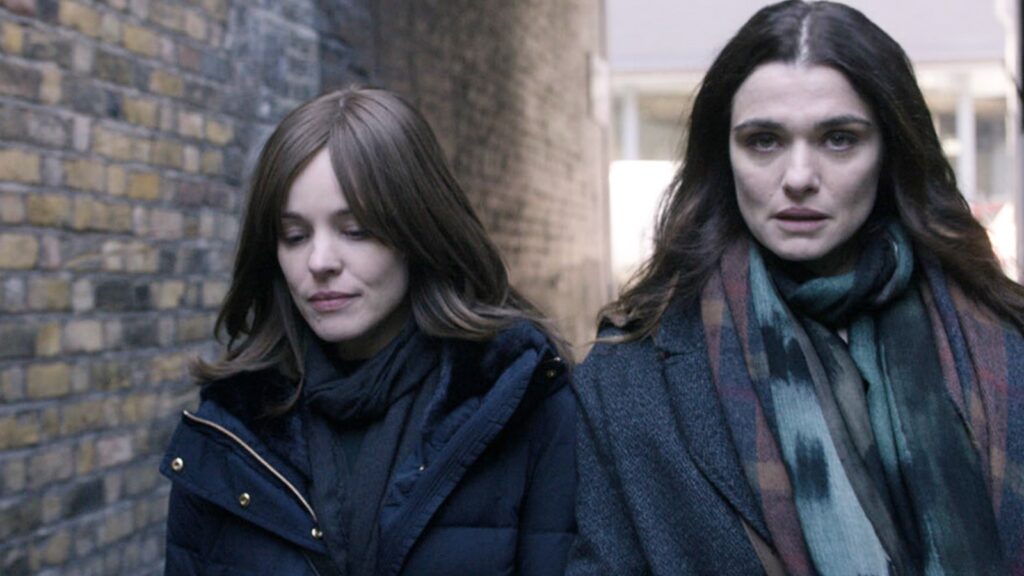
Chris: My favorite movie so far is Disobedience, the lesbian drama that stars Rachel Weisz and Rachel McAdams in an Orthodox Jewish community that very much frowns upon anything other than strict, heterosexual marriages. To me, it was such a powerful film with a beautifully told story.
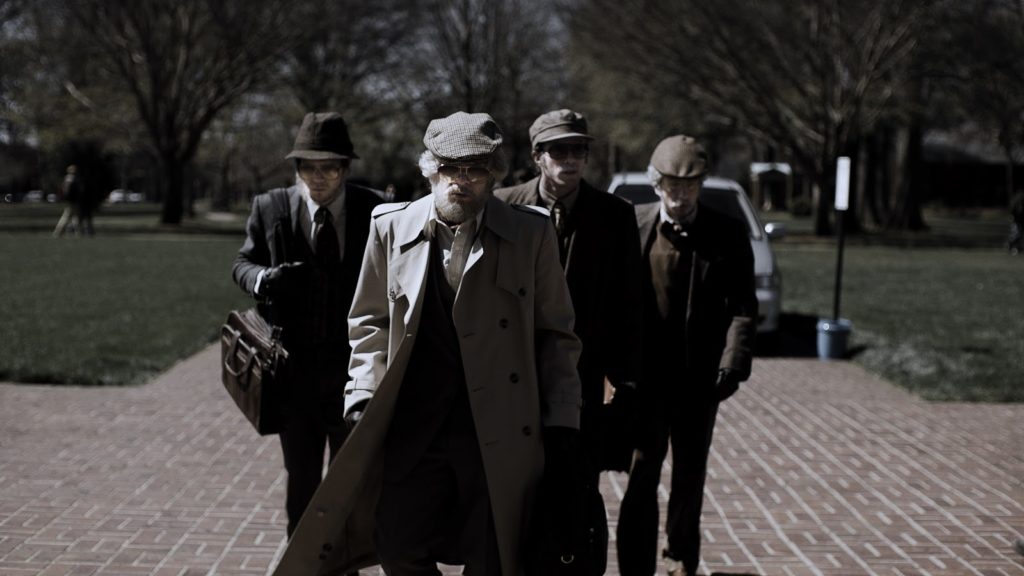
Josh: Disobedience is definitely in the top half of my list, too. But at this point, I had the most fun with the snappy narrative-documentary heist movie American Animals with its twisty recreation of a very stupid crime that exploited the conventions of the genre to comment on the fallibility of memory and the toll taken by a fear of being ordinary; had the most feels during Mister Rogers documentary Won’t You Be My Neighbor; and laughed the most at Boots Riley’s audaciously incendiary Sorry to Bother You: the future of late-stage capitalism has never looked more absurd, hilarious, and terrifying than with Lakeith Stanfield as a telemarketer climbing the ranks of corporate evil with David Cross’s voice and Armie Hammer making a heel turn as the C.E.Bro getting rich off of modern slavery. It’s a real wild ride and I hope more people get to see it soon.
Chris: I was disappointed to miss American Animals, especially with how much Josh enjoyed it. Fortunately, MoviePass will ensure it gets a wide release and I think it’ll be in Seattle theaters again by the end of SIFF.
As for what I did see, I think there are a lot of very strong documentaries this year. Won’t You Be My Neighbor is, of course, special and one that I think will be a big hit when it goes into wide release this month (June 15 in Seattle). I don’t want to talk too much about it, and save that for when I’m legally allowed to share my (too short) interview with director Morgan Neville. Afghan Cycles and The Russian Five were two great, sports docs, and Shakedown, Ballet Now, and People’s Republic of Desire invited us into worlds we wouldn’t otherwise get the chance to experience.
Tony: On the documentary front, I also saw a couple of great ones. I know that Chris and I are big fans of Afghan Cycles, the Sarah Menzies-directed doc about the Afghanistan Women’s Cycling Team. I reviewed it in more detail at another website, so I’ll only add that Menzies has crafted one intensely cinematic story, with shots and scenes so perfectly executed and assembled it’s amazing that it’s all real.
I was also powerfully moved by The Most Dangerous Year, Vlada Knowlton’s affecting story of the fight against Washington State’s decidedly discriminatory anti-transgender ‘bathroom bills.’ The movie’s more of a traditional doc in structure than Afghan Cycles, but it’s an emotionally resonant and factually persuasive case for legislative acceptance as well as for basic human tolerance for trans people. Knowlton also manages to balance her very personal investment in the topic (she is mother to a trans daughter, Annabelle) with incredible even-handedness, never demonizing the opposing forces in this ongoing debate. She spoke to me in greater detail at City Arts recently.
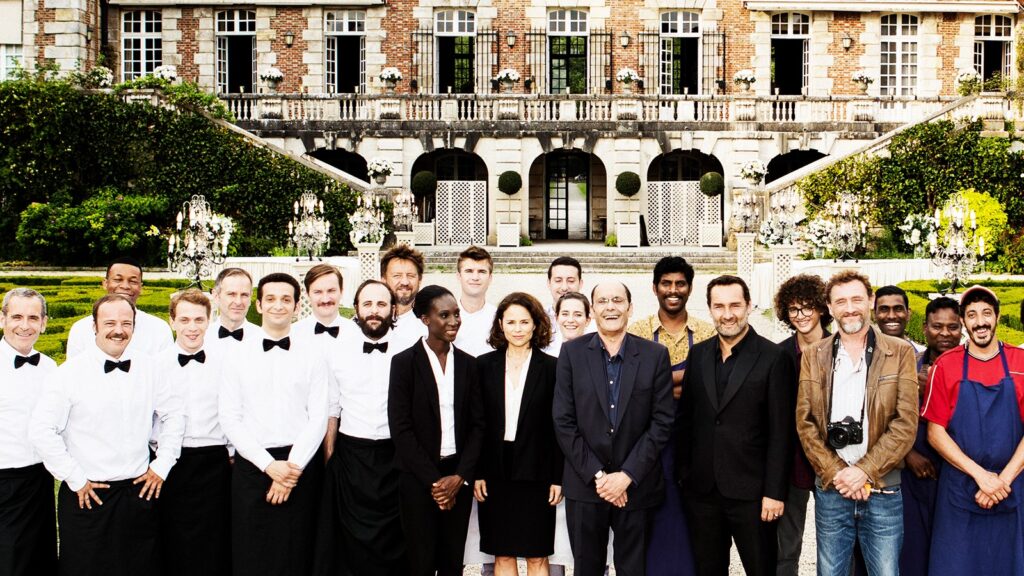
Morgen: It’s been a mixed bag, but I’ve only really loved one so far (Hearts Beat Loud). I also saw C’est La Vie and Number One. Both French, both incredibly different. I enjoyed the first better than the second, but that’s because I enjoy comedies more. Number One was incredibly heavy and at times I couldn’t tell if something terrible was going to happen to the lead simply because of the ominous music constantly playing in the background (spoiler: nothing really ever did).
I loved C’est La Vie even though it was nearly two hours long. It flew by, was very charming. It definitely couldn’t have been made in the states and still been that good in that way. It was wry, if it was an American film it would have been a slapstick comedy… terrible.
Tony: Finally, a quick shout-out to Prospect and Automata, two really, really strong locally-made science-fiction efforts. The former is a visceral survival western in genre drag, effortlessly detailed in its depiction of a far-off planet (the Hoh Rain Forest makes a great stand-in for an alien world) and the ragged, duct-taped lifestyle its prospector protagonists lead. And Automata’s a kick of a web series that transposes Raymond Chandler pulp with a distinctive retro-sci-fi universe I wanted to keep exploring after it ended. Again, I wrote about these in more detail here and here (aside from pimping said pieces, I don’t want you guys to attribute my low film tally to me being a SIFF Slacker).
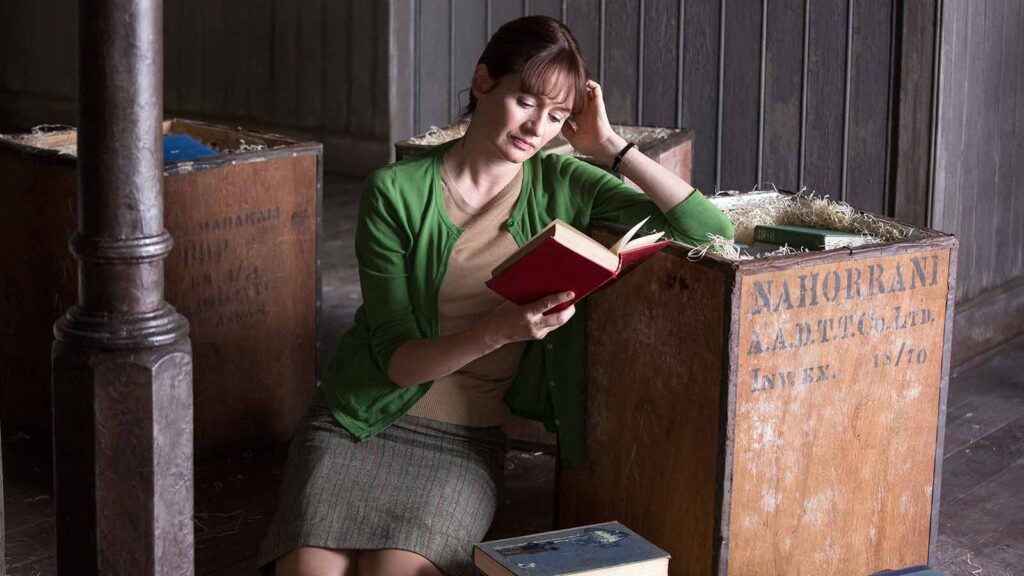
They can’t all be winners for everyone — anything terrible so far? Since so much of the festival is good-to-great, it’s always morbidly a little more fun and revealing to hear about what didn’t work.
Tony: Honestly, I really haven’t seen anything that was terrible. The closest thing to that moniker for me was probably the SIFF Opening Night Gala film, The Bookshop. SIFF Artistic Director Beth Barrett has cited the film’s status as a female-directed feature that celebrates storytelling as the rationale behind the film’s inclusion as SIFF’s Opening Nighter. Is it too late to discuss it in detail, fellow round-tablers? I have a feeling those of us who’ve seen it will likely concur on its merits and liabilities.
Josh: It’s never too late to dissect the Opening Night film! I missed it and have been waiting to hear the gory details.
Tony: OK: for the uninitiated, The Bookshop is a low-key UK indie period piece from director Isabel Coixet that revolves around the attempts of a widow (Emily Mortimer) to open and maintain a bookstore in a tiny British coastal town. There’s really not much wrong with it, per se: The period details are right, the performances are good (specifically Patricia Clarkson as the wealthy, icy-bitch queen bee of the community and most certainly Bill Nighy as the town eccentric whose misanthropic exterior houses more complexity than is first apparent), and it’s crafted with intelligence and taste.
But it just never does much to stand out or be memorable. The key word is restraint, or specifically too much of it. The class-war implications don’t cut as sharp as they should, the laughs are polite chuckles, and the ending, which should resonate hugely, doesn’t feel particularly memorable. That said, Nighy is utterly phenomenal: If all the other aspects of the movie weren’t so vanilla-pleasant, we’d be whispering the O word (Oscar) about now.
Chris: I dunno, I might be in the minority, but I liked The Bookshop quite a bit. Everything Tony said is true, but I thought it had some great moments, even if it was a little hamfisted at times. There aren’t a ton of great movies that capture why reading is such a worthwhile activity, but I think this one came close. Bill Nighy is always great to watch on screen, and I particularly loved watching his character fall in love with Ray Bradbury’s fiction. Emily Mortimer is a delight, unsurprisingly.
Josh: Well, now I at least feel a bit better about skipping Opening Night. One of my least favorites also came early in the festival, too. It’s really hard to believe that something with such great acting from the always-wonderful Vera Farmiga and Christopher Plummer could fall so horribly flat, but Boundaries remains at the bottom of the pile for me. She’s a codependent single mother with an awkward son and a Seattle home overflowing with Instagram-ready rescue pets; he’s her scoundrel father who gets kicked out of his retirement community for dealing marijuana. Somehow he cons her into a weeklong roadtrip that takes her away from her apparently plush job planning parties for rich people so that he can make one last score. From the illicit drug trade to an artistic kid not being able to fit in anywhere in Seattle, not a single note rings true and in the end it seems like everyone involved just gives up and calls all of the many conflicts miraculously resolved, which I suppose is a small mercy in terms of the running time.
Chris: I concur with Josh on Boundaries. Nothing felt authentic, and I’m particular about movies set in Seattle, but this could’ve been set in any random city, and it would’ve been better. I’m still bothered by Vera Farmiga’s character being surprised her GPS was changed so she didn’t notice that she was no longer on I-5. Everyone knows that’s how you drive from Seattle to Los Angeles.
Tony: It’s hair-splitting because you asked, Josh, but… I also liked–but didn’t love–The Devil’s Doorway, a found-footage horror film from North Ireland director Aislynn Clarke. Nearly all of the cited (found) footage was shot on 16mm. That filigrees the story (about two vatican priests investigating possible misdeeds and maybe a demonic possession in a remote convent) nicely with a wonderful air of something old and not meant for your eyes to see. It’s solid enough but not quite a home run despite solid acting, good pacing, and some pretty terrific jump scares.
Chris: For me, though, Nona was the worst thing I saw at SIFF. It’s a human traffic drama set mostly in South America that, I thought, read like a commercial to build support for Trump’s border wall among liberals. Kate Bosworth (who also produced and whose husband directed) shows up in the most patronizing way possible, as the white saviour.
Tony: A much bigger letdown for me, genre division, was The Field Guide to Evil. Horror anthologies are, as I’ve articulated before, total catnip for me, and with a roster of international directors (including the minds behind some of my favorite recent genre efforts, including SIFF ‘16 fave The Lure, Goodnight Mommy, and Berberian Sound Studio) giving voice to folk tales of their homelands, it seemed like a slam-dunk. But despite most of the shorts being visually beautiful and rendered with great craftsmanship, I never felt moved emotionally or shocked viscerally. The movie’s also emblematic of a problem with a lot of modern horror anthologies: In an apparent bid to avoid being too literal and providing too blatant a ‘twist’ at the end, an awful lot of anthology segments seem to just meander to a conclusion with absolute zero sense of closure. Maybe it’s a cultural translation issue, but I kinda don’t think so. Honestly, Terror Internationale, a pretty terrific collection of Festival-curated international horror shorts, scratched my horror anthology itch a lot better.
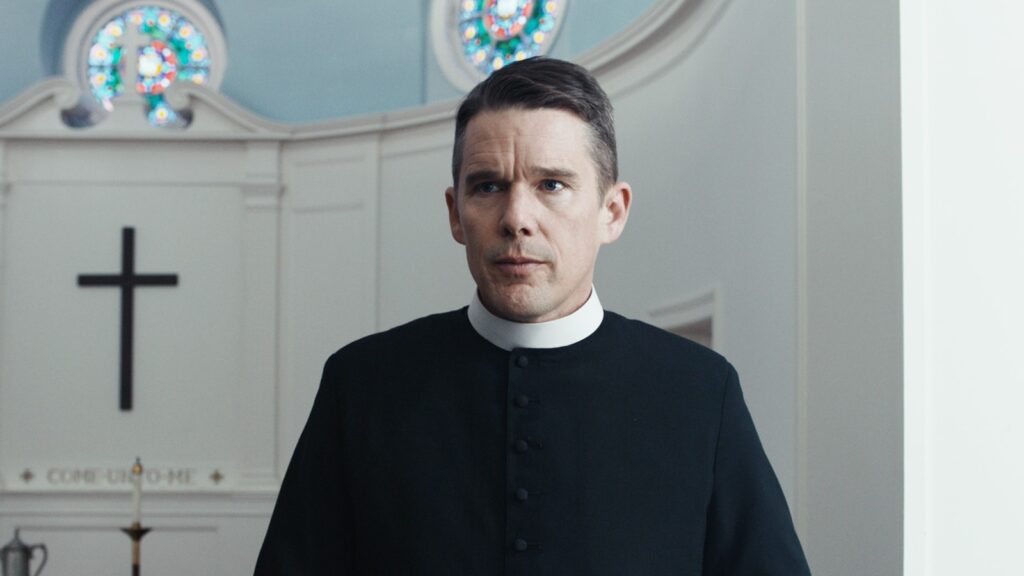
Josh: Far more worthwhile, but I just can’t wrap my head around the immense, near universal praise that First Reformed has been getting since I saw it as my first press screening of this year’s festival. I was fully onboard for so much of Paul Schrader’s portrait of a lonely, depressed priest whose encounter with a radical environmental parishioner spurs a crisis of faith. Ethan Hawke is indeed exceptional he copes with personal tragedy and professional confusion in intellectual wrestling matches with an eco-terrorist, while tending to his tiny flock and the historical chapel that functions as a tourist spot for a local megachurch, presiding over a bizarro junkyard funeral, and generally reckoning with the absurdity of modern life. As much as I was along for the ride, as it all came to a head, the final scene felt like everything going off the rails in a way that lost me entirely and made me question my admiration for everything that came before.
Morgen: I’m on board with Josh’s feelings on First Reformed. I still don’t know if I like it. I’m incredibly annoyed about how it ended. I was thinking to myself in the middle of the film how I was happy that there was genuinely no romantic aspect between the two main characters and then bam! at the end.
Josh: Yeah, of all the wild stuff that happens as Hawke’s character goes through his breakdown, that last kiss seemed more absurd than the very absurd stuff that preceded it! I’ve talked to others who said that it was set-up from the start, but I just didn’t see it. A lot of critics that I really admire have loved this film; so maybe I owe it a second look.
Chris: I’m not sure about your admiration, Josh, but I actually put First Reformed high on my list. I really loved it. I thought Ethan Hawke’s acting was outstanding as Rev. Toller, who you could see having a crisis of faith while his tourist-trap church is about to celebrate a milestone anniversary. What I most enjoyed, though, was seeing how director Paul Schrader thinks through issues. It’s remarkable consistent with street crime in Taxi Driver (which he wrote and it came out three years before I was born) and climate change in First Reformed. I didn’t think the ending was out of place either, even though, yeah, I’m usually bothered when a romance is forced upon us because the two lead actors are attractive. I didn’t find that bothersome because I didn’t feel like the story was building towards the romance becoming inevitable, but became a realization that they both cared for one another and were invested in their continuing existence.
Anything else to mention from your film journal?
Tony: The SIFF Opening Night Gala was still a fun well-coordinated affair again this go ‘round, but I do have to carp about the DJ’s music selection. I am morally opposed to Bon Jovi’s “Living on a Prayer” being offered as dance floor fodder. Then again, I reckon I’m morally opposed to Bon Jovi’s “Living on a Prayer,” period.
Chris: I don’t know if this is noteworthy, but I’ve noticed a lot more films than usual seem to have played SIFF early in the festival and then went into wide(r) release almost immediately. If you missed Beast, Disobedience, or On Chesil Beach, you can see them at Pacific Place. And American Animals is out this weekend and Hearts Beat Loud and Won’t You Be My Neighbor the next.
Tony: That is an interesting development, and likely a burr in Festival organizer’s collective saddle. Maybe it’s a side-effect of how convoluted film distribution’s become in this wake of VOD, On Demand, Netflix, and Amazon
Josh: One upside of the convolution of distribution is The Secret Festival. This is the first year that I’ve given it a shot and by oath, I’m not allowed to say anything about what we’ve seen so far, but I will note that it has been an enjoyable experience. Without commenting on the quality of the films themselves or the nature of why they’re in the Secret instead of the main Festival, I will say there is something kind of great in the midst of an overcrowded film festival about not having to spend even a minute thinking about what to see. You just show up at the Egyptian at 11 am on a Sunday, trust in Beth Barrett’s judgement, wait for the opening credits to reveal the surprise, and enjoy the ride.
Morgen: Since my attendance has been a bit sparse, I don’t have a ton to say here but I’ve been enjoying the screenings. I think I much prefer actually going with the regular crowd, I’m noticing that the folks at the press screenings are more of a little crew and even if they don’t want to see the film they go anyway. At the end of Hearts Beat Loud (which I thoroughly enjoyed) someone said “Well there’s 2 hours of my time i won’t get back”. If you were there to see that film, you wouldn’t have said that.
Chris: Ugh. With 433 films playing at SIFF, not everything is going to be great, but my experiences have been on par with Morgen’s w/r/t to the passholders at the press screenings. I had gotten scolded by one lady because my watch lit up for a moment when I scratched the back of my head. But the passholder crew (who have earned the nickname “passholes”) has really taken over the press screenings where they’re barely for press anymore. You’re far more likely to hear an announcement about “Hawaiian Shirt Thursdays” than you are to hear the name of the director of the movie you’re about to watch.
Josh: I love the convenience of Pacific Place, but have often wondered why SIFF doesn’t make use of their Film Center and just do screenings in the evening for the press. On the other hand, its nice to see a film with a crowd and I appreciate that admission to the press screenings is a big perk for the biggest SIFF fans who shell out hard-earned for a pass. However, the contrast between the press-only and wider-admission press screenings is stark. You really get the sense that some of the die-hards take these showings incredibly seriously as part of their quest to catch ‘em all, making it feel very intense and clubby to the uninitiated.
Tony: This is why we can’t have nice things.
Josh: To end on a positive note, I’ll also mention that The SIFF Lounge is another fantastic passholder perk! I don’t know that I’ve visited in previous years, but this year’s space being so close to the Uptown combined with all of the great snacks and drinks makes it a great little escape between screenings to refuel and chat up friends.
With that, let’s head out and enjoy the waning days of the festival. We’ll reconvene again after the credits roll to dissect the winners of the official competitions, the audience awards, find out what makes the Best of SIFF programming, and nominate our own bests of the festival.
